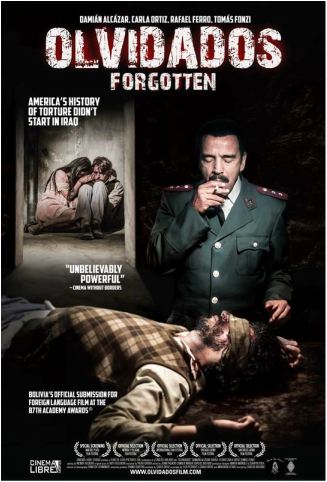 Film chronicles the horrors perpetrated under “Operation Condor.” Film chronicles the horrors perpetrated under “Operation Condor.”
Tags: crime/law/deviance, government/the state, historical sociology, violence, war/military, authority, human rights, imprisonment, state terror, torture, 61+ mins
Year: 2015 Length: 72:00 Access: no online access (trailer here) Summary: The film Olvidados explores the horrors perpetrated under “Operation Condor,” which was responsible for: 50,000 deaths; 30,000 “disappeared”; and 400,000 arrested and imprisoned in Argentina, Bolivia, Brazil, Chile, Paraguay, and Uruguay. In the 1970’s, Operation Condor was a US-backed program to install right wing dictators in Latin America to eliminate the threat of communism. To accomplish this, the CIA provided training and support to the militaries of Argentina, Chile, Bolivia, Paraguay, and Uruguay, which led to the disappearance of tens of thousands of citizens all of whom suffered from some of the worst violations of human rights in modern history. In the film, an aged Bolivian General, José (Damián Alcázar, El Narco), looks for redemption after suffering from a heart attack by confessing truth to his only son about his role in the persecution of countless men and women. Among the people who were “disappeared” are a journalist (Carlotto Cotta), a dancer (Ana Calentano), an activist (Tomás Fonzi), and a pregnant woman (Carla Ortiz) – all of whom were brutalized at the hands of José and other military leaders, which produced a cascade of lies and betrayal across generations. The historical events chronicled in the film would be useful to help teach numerous sociological topics, including concepts related to the state, authority, military, torture, imprisonment, human rights, and social justice. It could also be a useful resource for a travel learning course that focuses on any of these South American countries. Submitted By: Cinema Libre Studio
4 Comments
 An arts-based exploration of global capitalism's contradictions. An arts-based exploration of global capitalism's contradictions. Tags: art/music, capitalism, class, globalization, historical sociology, inequality, marx/marxism, race/ethnicity, social mvmts/social change/resistance, alienation, counter-hegemony, crisis, ideology, patriarchy, social justice, subtitles/CC, 06 to 10 mins Year: 2013 Length: 6:20 Access: YouTube Summary: Blind Eye Forward (BEF) is an attempt to convey in words, music, and imagery the contradictory character of contemporary global capitalism, with attention to its historical formation, the social and ecological maladies that issue from its logic of dispossession and commodification, and the movements that, in response to those maladies, are struggling for a better world. A minor blues accompanied by still images and popular-cultural video clips, BEF begins at an ideological juncture and moves successively through issues of militarism, alienation and reification, and the challenge of creating the new within an obdurate present. In its middle part, which is carried musically by an extensive guitar solo, the piece moves through a world-historical narrative of colonial dispossession, slavery and the construction of "race", patriarchy, and capital and class. The final verse, though pessimistic, invites us to keep a red rose fastened to our chest, and to temper our pessimism with a Gramscian optimism of the will. Blind Eye Forward is useful as a discussion piece in learning contexts that problematize social inequality and the irrationalities of capitalism, within a broadly Marxist perspective. Pedagogically, it employs an arts-based approach, which can complement more expository communicative styles. Students generally find it both inspiring and troubling. It is important to reserve time after showing it in class for comments, questions, and dialogue. (Note: The piece does not have subtitles but the complete lyrics can be accessed by clicking "show more" under the description on the YouTube site.) Submitted By: William K. Carroll 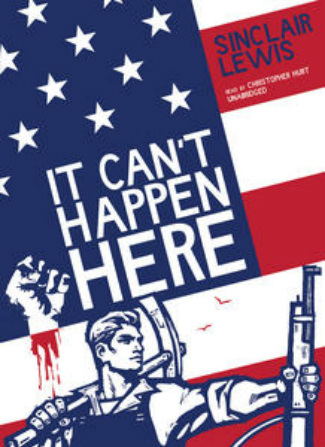 Film explores whether the US is immune to tyrannical rule. Film explores whether the US is immune to tyrannical rule. Tags: crime/law/deviance, government/the state, historical sociology, inequality, nationalism, politics/election/voting, dictatorship, domination, oligarchy, social construction of reality, tyranny, 61+ mins Year: 2013 Length: 94:23 Access: Top Documentary Films Summary: As stated on the film's website: "There are many perfect examples in our recent history which undoubtedly show that dictatorial regimes impose subjection, blackmail, servitude, intimidation, abuse, persecution and execution upon innocent people. However, many Americans are strongly convinced and assuredly assert that such a thing could never happen in the United States. But is this just desirous reasoning? Or, is there something essentially disparate about the United States that makes it resistant to the despotic abuse that has afflicted every other considerable empire in history? The primary step in scrutinizing the assertion that it can't happen here is to recognize and describe what "IT" is. Many people have distorted, almost comic-book-type, impression of dictatorship. In the real world autocracy has always crept in under the pretense of safeguarding the nation, defending the people, and establishing law and order. A dictator, in order to acquire and hold power, must demand the support of the people. An effective oppressor cannot publicly display malevolence and desire for power but must design his approach so as to persuade the people that his goals are righteous, that he wants honesty and fairness to abound, and that the most desirable way to make that true is to give him or her dominance and authority. Tyrannical governments develop by abusing people's fears - economic uncertainty, crime, foreign aggressors and so on and persuading the people that the quick-fix is for a political leader to be legally given absolute jurisdiction so he can shield the people from the wickedness of the world. This is always the pattern out of which autocracy is born. No matter how cruel or bloodthirsty regime becomes those in charge will persist to claim noble intentions and will dictate that an extreme government powers are required to protect the people and to create justice and order. Every time mankind has taken a step away from democracy and towards autocracy it was done in the name of defending the country and the people." Submitted By: Tom Sparhawk 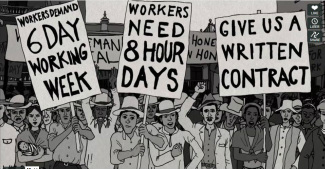 Columbian banana workers demand basic labor rights. Columbian banana workers demand basic labor rights. Tags: capitalism, class, economic sociology, government/the state, historical sociology, inequality, organizations/occupations/work, political economy, social mvmts/social change/resistance, theory, violence, war/military, ideology, labor, neocolonialism, postcolonialism, postcolonial theory, propaganda, 00 to 05 mins Year: 2013 Length: 2:43 Access: Vimeo Summary: This animated excerpt comes from the documentary, "Banana Land: Blood, Bullets and Poison." The clip recounts the events of December 6, 1928, when Colombian workers gathered to the protest the conditions of their employment under the United Fruit Company (UFC), which is now known as Chiquita. As the film explains, by the early twentieth century UFC had become a powerful multinational corporation, and in exchange for its role in helping to prop up repressive regimes in Latin America, the company was afforded cheap land, and in time, it came to develop a monopoly on the transport of fruit in the region. When workers organized to demand better working conditions, including 6-day work weeks, 8-hour work days, money instead of scrip, and written contracts, they were met with a violent response from the Colombian military. Protecting the interests of American economic elites, the United States government threatened to invade Colombia in order to quell the UFC worker protests, and in response, the Colombian government dispatched a regiment from its own army to do the job. The Colombian troops effectively created a kill box, setting their machine guns on the roofs surrounding the plaza where a group of protestors had gathered. After a five-minute warning to disperse, the troops opened fire killing women, men, and children. Other than a sobering reminder of the power corporations often wield over the lives of workers, especially when they have the backing of states, this clip would work well as a means of introducing some of the basic components of postcolonial theory, which can be understood as a body of thought that critiques and aims to transcend the structures supportive of Western colonialism and its legacies. In contrast to Marxist dependency theories and the world systems perspective, work in the postcolonial tradition tends to emphasize cultural, ideological, and even psychological structures born from the forceful and global expansions and occupations of Western empires (Go 2012). The banana strike and its violent conclusion is a vivid example of the way the United States has maintained a postcolonial grip on the running of foreign economies. In this case, a propaganda machine chipped away at international sympathy for the protesting workers, while at the same time, the U.S. was able to wield power over the Colombian government by mere threat of military force. Submitted By: Lester Andrist 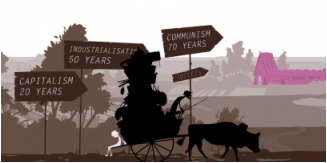 "Poor Us" examines the changing world of poverty. "Poor Us" examines the changing world of poverty. Tags: capitalism, class, globalization, historical sociology, inequality, methodology/statistics, political/economy, absolute poverty, antônio conselheiro, charity, colonialism, comparative historical analysis, industrial revolution, poorhouse, relative poverty, social history, welfare state, workhouse, 21 to 60 mins Year: 2013 Length: 58:05 Access: YouTube Summary: This exquisitely animated documentary tells a sweeping social history of world poverty. You, the viewer, are the protagonist in this film floating through the meandering jet stream of world history. "If we want to make poverty history," the narrator explains, "then first, we need to understand the history of poverty." ● The documentary appropriately begins in prehistory (2:35), and in a more or less linear fashion, moves through humanity's early large scale civilizations, including ancient Egypt (4:40) and ancient Greece (5:40). Zipping forward to the Middle Ages, the story unfolds again in Cairo (8:20), and then lingers in Paris of the same period (10:50). The history of colonialism is woven into the story with a look at the Spanish conquest of the Inca Empire (14:20), the Portuguese conquest of West Africa (16:20 and 34:40), and British colonial rule in India (36:00). Poverty in a neocolonial context is later examined in Ghana (38:50 and 43:55), and China makes appearances as the site of both model relief efforts and tragic famine (18:30 and 43:20). At the 20:30 mark the story returns to Western Europe in order to consider the impact of the Industrial Revolution on poverty, and then moves toward a conclusion which contemplates the changes wrought by globalization. ● While this 58-minute film understandably fails to deliver a truly exhaustive account of the the world-historical processes associated with poverty, the film would be an excellent tool for illustrating comparative historical analysis in sociology. Systematic comparison is of course central to comparative historical work, and this film succeeds in illustrating the importance of comparison by briefly drawing on eighteenth century China as a rare instance where prosperity for some didn't necessarily come at the cost of desperate poverty for others. What does the film's analysis of poverty gain by including this "negative" case in the story? One answer is that the case of China complicates the viewer's understanding of poverty by exposing its causes as far less determined and far more contingent. Submitted By: Lester Andrist  Tags: corporations, crime/law/deviance, economic sociology, government/the state, historical sociology, inequality, political economy, copyright law, subtitles/CC, 06 to 10 mins Year: 2011 Length: 6:30 Access: YouTube Summary: States, it is often said, must regulate corporations in order to ensure the greatest good for the greatest number of its citizens. Even the most ardent fiscal conservative would concede that antitrust laws are necessary in order to sustain a competitive market and protect consumers from price fixing. To take another example, when states enforce copyright laws, they "promote the progress of science and useful arts." While corporations may want to own a copyright forever, states are obliged to limit the duration of copyright protection in the interest of allowing other authors the ability to remake or build from classic stories. This is what benevolent, well-meaning states should do, but in practice, corporations often wield power over state regulators, and as C. G. P. Grey remarks in the above clip, on four separate occasions Congress has aligned with the narrow interest of corporate copyright holders that the length of copyright is too short to turn a profit and so extended it. But as Grey also points out, it's hard to imagine that J. K. Rowling "wouldn't have written Harry Potter if the copyright protection was just for her whole life and not an additional seven decades thereafter." The clip works well as a rather vivid antidote to the myth that markets are best left unregulated, and the clip is also a useful entrée into a discussion about how power—in this case, corporate power—shapes the formation of law, and perhaps even the ideological premises, which become the foundation of discussions about whether those laws should be changed in the first place. Submitted By: Sparhawk  Melissa Harris-Perry Melissa Harris-Perry Tags: abortion/reproduction, historical sociology, government/the state, politics/election/voting, theory, violence, weber, civil liberties, democracy, melissa harris-perry, social contract theory, states rights, thomas hobbes, 11 to 20 mins Year: 2012 Length: 20:55 Access: msnbc Summary: The social contract refers to the individual's acceptance of some social rules and limitations in exchange for the protections and benefits from the state. The concept was initially developed in the philosophies of Thomas Hobbes and Jean-Jacques Rousseau; however, sociologist Max Weber further specified the social contract as it relates to violence by highlighting how all forms of political organization including democracy, entrust "the state" (e.g. government at all levels) as the only social institution that can legitimately use physical force. In this video, political scientist and pundit Melissa Harris-Perry applies this Weberian approach by arguing that the State of Virginia failed to force women to undergo an invasive procedure, known as a transvaginal sonogram, prior to having an abortion because social consensus concluded it was not a legitimate use of force (or even violence) by the government. In other words, the state was in breach of the social contract. For a similar discussion on the same political issue, Rachel Maddow explores the fringe pro-life movement’s use of illegitimate violence against abortion doctors in her full-length documentary, The Assassination of Dr. Tiller. Submitted By: Jason Eastman 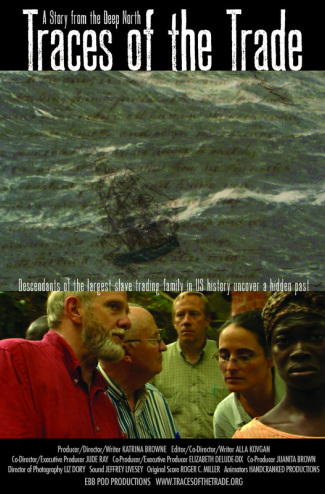 Tags: capitalism, historical sociology, inequality, marriage/family, race/ethnicity, racism, slavery, white privilege, 61+ mins Year: 2008 Length: 86:00 Access: Netflix (trailer here) Summary: This full-length documentary follows a family's journey—headed by family member/filmmaker Katrina Browne—through the Triangle Trade between Rhode Island, West Africa, and Cuba. In doing so, family members begin to recognize how their White privilege is directly tied to enslavement of Africans by their ancestors. The film is useful for the classroom in four ways: 1) it provides a history lesson of the Triangle Trade, demonstrating how the American North was/is as culpable in the enslavement of Africans as the South, 2) it demonstrates the direct tie between New World/American capitalism and its survival to the slave trade, 3) it slowly reveals the consciousness-raising of privileged White folks as they understand how their privilege is directly tied to slavery and racism, and 4) it demonstrates the awkward yet necessary dialogues and discussions White people need to have about U.S. history and racism. I like to use this film as a companion to Tim Wise's talk "The Pathology of White Privilege." After my students watch Traces of the Trade and Wise's talk, we discuss how contemporary White privilege is directly tied to the conception of our nation, the contradictions and paradoxes of capitalism and democracy, and their own embodied and/or witnessed experiences of White privilege. The film's website includes purchasing information and teaching materials. Another great companion piece to Browne's documentary is the book Inheriting the Trade. Written by Browne's relative Thomas DeWolf, the book more deeply documents the family's physical and social psychological journey. Submitted By: Beverly M. Pratt 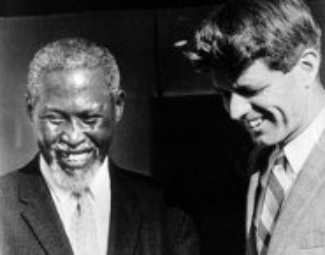 Tags: historical sociology, inequality, race/ethnicity, apartheid, racism, robert f. kennedy, south africa, subtitles/CC, 00 to 05 mins Year: 1966 Length: 1:22 Access: audio and transcript Summary: This is an audio excerpt from Robert F. Kennedy's famous "Day of Affirmation" speech given at the University of Capetown, South Africa on June 6, 1966. I use the first 1 minute and 20 seconds from Kennedy's speech to introduce the racism section of my Social Problems course. The speech begins with Kennedy describing a country beguiled with a history of slavery and racism. During this time, the audience (including the contemporary listener) seemingly assumes Kennedy is describing South Africa. Near the end of this introduction, however, he reveals that he has been describing the United States. Once revealed, the crowd dramatically bursts into applause. I play this audio in class, repeating it once, with the text of the speech displayed on PowerPoint so that students can read along; I find that the piece sets an effective tone for the enormity of the racism discussion to follow. The clip is also useful for stimulating students' sociological imaginations, as Kennedy succinctly lays out the Unites States' racial/racist history. With sociological imaginations engaged, I go into a brief history lesson of racial construction in the U.S. before going into contemporary facts/figures. The PBS documentary RFK in the Land of Apartheid: A Ripple of Hope (2009) chronicles Kennedy's South African trip at the height of South African and American apartheid; check out the film's website to view the trailer and other useful teaching materials. Submitted By: Beverly M. Pratt 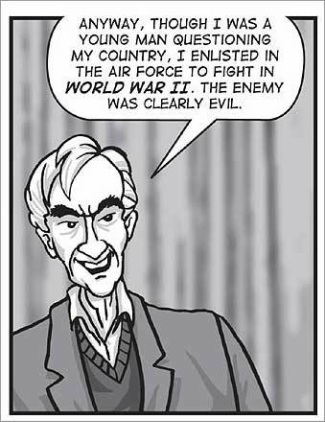 Viggo Mortensen reads Howard Zinn Viggo Mortensen reads Howard Zinn Tags: education, government/the state, historical sociology, knowledge, nationalism, political economy, war/military, activism, empire, howard zinn, imperialism, sociological imagination, subtitles/CC, 06 to 10 mins Year: 2008 Length: 8:35 Access: YouTube Summary: This video portrays Howard Zinn's essay "Empire or Humanity?: What the classroom didn’t teach me about the American empire" as narrated by the actor Viggo Mortensen (original essay and teaching materials posted here). It traces Zinn's own development of his sociological imagination, his miseducation in public schools, and his critique of US foreign policy. This video is good for introducing the concept of the sociological imagination, the connecting of private troubles to public issues (CW Mills), and thinking critically about issues of power, empire, and imperialism. It may be useful during an introductory lecture in lower level sociology classes (particularly Intro to Sociology, Social Problems, or Contemporary Theory). It can be used as an ice-breaker for beginning to talk about the sociological imagination as a way of seeing by looking for patterns, thinking critically, and connecting one's "private troubles" to "public issues." Submitted By: Dave Paul Strohecker (@dpsFTW) |
Tags
All
.
Got any videos?
Are you finding useful videos for your classes? Do you have good videos you use in your own classes? Please consider submitting your videos here and helping us build our database!
|
 RSS Feed
RSS Feed
